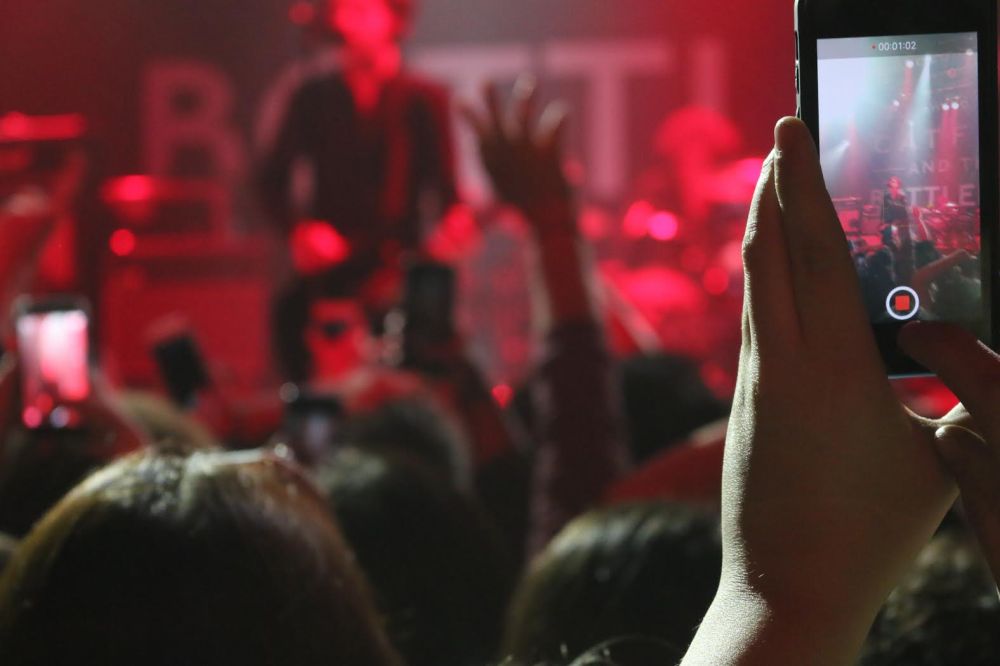
Mediated art: Aside from the fact that her hand was in my way…this girl had been recording for OVER A MINUTE. How much did she miss out on?!
They were the most stereotypical punk couple I had ever seen. The guy rocked a studded leather jacket with chains protruding from his pockets. The girl had as many piercings in her face as tattoos on her arms and chest—which is to say, more than she could count on her black-painted fingernails. And they were going absolutely nuts to the crazed music of Oklahoma-based garage rockers BRONCHO.
One part of me was terrified for my brain as I ducked the guy’s flying elbows. Another part of me was annoyed, because as hard as it already is to take notes at a concert in the dark, it’s even harder when someone’s smacking into your arm every few seconds. My music-reviewing handwriting usually comes out somewhere between a drug prescription and a first grader going sans pencil grippie for the first time; this night, I essentially scribbled out an EKG of the punks’ dance energy. If the purpose of note taking is to write down specific occurrences from a band’s performance, then I had cramped up my hand for no reason.
But as I decompressed in bed later that night, away from the sweat-soaked floor of Chicago’s Lincoln Hall, a different feeling washed over me: gratitude. Gratitude at the ecstasy of the dancers, who were so completely lost in the music that they made no notice of their immediate surroundings (read: me). Gratitude at the group of eight or so yuppies shaking and shimmying for the entirety of the opening band’s set. But most of all, gratitude at the lack of damn cell phones in hand at all times.
It happens at nearly every notable concert I attend, and it eats away at me. Instead of dancing to songs that were meant for dancing, people in the midst of the general admission throng stand as still as they possibly can (not very, given the hubbub of the setting) and loft their Galaxy S4s and iPhone 6Ss skyward to capture as many moments as possible for posterity. Maybe they’ll Snapchat the anthemic choruses to their friends, or post an Instagram clip of the amazing drop or guitar solo expecting to rake in at least a hundred likes. Maybe they just want something to watch the next day as they’re coming down from the emotional high of the previous evening.
To some extent, I’m fine with that. The sensory aspects of memory respond powerfully to pictures and videos that allow us to relive amazing moments of our lives. We can revive some of those indelible feelings, recapture an afterglow of elation, and reminisce on the already happy past with rose-colored lenses. Pride plays a role as well, as we incorporate the experiences into our sense of self and share them with friends as if we’re somehow better people for having been there.
But in the process of recording the present for the future’s sake, what do we miss in the present?
Friedrich Nietzsche spoke of music as the artistic expression of the Dionysian, the formless, abyssal life force that aches to direct human action. The Dionysian cannot be contained within the boundaries of a self, or transcendent value, or time—it’s spontaneous, it’s life-affirming, it’s completely within the moment. Stepping out of the immersive, ecstatic experience of a concert to document the moment in the permanent form of a picture or video is a denial of the music’s very life energy. And if you’re not experiencing the music in full, if you wrench yourself away with an eye on social media or later viewing pleasure, your memory of the show—both in your mind and in your smartphone—will not make up for the fact that you didn’t make the most of the moment.
This is a notion I struggle with any time I’m on the job. Do I look down at my notepad to ensure that I’ll be able to recount the setlist in detail and risk missing a frontman’s priceless facial expression? When I snap a picture and view the concert through the camera’s eye, even for a few seconds at a time, can I adequately track the stream of emotions the music evokes in me? How can I even review a concert accurately when the very act of review not only can never recreate the experience, but actually changes the experience by putting it through the filter of my hippocampus? I do my best to strike a balance, keeping one foot in the sonic river and one foot on the dry bank of objectivity—after all, the people who will read the review weren’t at the show, so I need a taste of outside perspective to do them justice.
I wonder how other journalists feel when they cover a live event, particularly in an age when they’re expected to keep one hand on their Twitter at all times. Social media has made it much easier to follow along with breaking news from home, but would we get a more accurate and more valuable narrative if we allowed our reporters to submerge themselves in the present and then churn out the story later, in a time of reflection?
Unfortunately, it’s part of the writer’s credo to live in the present and the future simultaneously. This is not required of concertgoers. And yet so many choose to eschew the glorious ecstasy of the moment for the translucent idea of collecting artifacts. By using a recording to supplement memory, they sacrifice the true timelessness of the experience.
I envy the punks who were able to lose themselves in dance at the BRONCHO show. I just wish more people would follow their lead.
